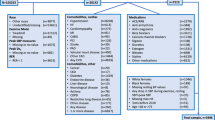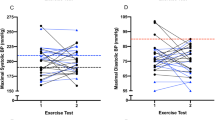Abstract
Several studies have shown that exaggerated blood pressure (BP) response to exercise can predict the development of hypertension and target organ damage, but others did not. The aim of this study was to evaluate the relationship between exaggerated BP response to exercise (ExBPR) and the development of hypertension or cardiovascular disease. We reviewed the charts of male subjects who, during the years 1991–1994, had a routine check up that included an exercise stress-test. For each subject, the following parameters were noted: age; body mass index (BMI); history of diabetes; cigarette smoking; family history of ischaemic heart disease and lipid profile. BP and heart rate at rest and during exercise were recorded as well. ExBPR was defined whenever peak exercise systolic BP or diastolic BP was over 200 mm Hg or 100 mm Hg respectively. We identified 73 males who exhibited ExBPR and matched them with a control group of 117 subjects with similar age who had a normal BP response. The mean age of the studied group was 42.6 years and the average follow-up was 5.7 years. Baseline characteristics were similar in both groups. During the follow-up we observed hypertension among 22% in those with ExBPR in contrast to 2.6% in the control group (P < 0.0001). In addition, more subjects of the ExBPR group required cardiovascular medications than of those in the control group (19.2% vs 4.3%, P = 0.0008). Thus, it seems that ExBPR predicts the development of hypertension and cardiovascular diseases. We therefore suggest that subjects with ExBPR should be followed more closely and be instructed for lifestyle modifications which may delay the development of such diseases.
This is a preview of subscription content, access via your institution
Access options
Subscribe to this journal
Receive 12 digital issues and online access to articles
$119.00 per year
only $9.92 per issue
Buy this article
- Purchase on Springer Link
- Instant access to full article PDF
Prices may be subject to local taxes which are calculated during checkout
Similar content being viewed by others
Author information
Authors and Affiliations
Corresponding author
Rights and permissions
About this article
Cite this article
Sharabi, Y., Ben-Cnaan, R., Hanin, A. et al. The significance of hypertensive response to exercise as a predictor of hypertension and cardiovascular disease. J Hum Hypertens 15, 353–356 (2001). https://doi.org/10.1038/sj.jhh.1001157
Received:
Accepted:
Published:
Issue Date:
DOI: https://doi.org/10.1038/sj.jhh.1001157
Keywords
This article is cited by
-
Hypertensive response to exercise, hypertension and heart failure with preserved ejection fraction (HFpEF)—a continuum of disease?
Wiener klinische Wochenschrift (2023)
-
Pathophysiology of the exaggerated blood pressure response to exercise
Hypertension Research (2022)
-
Orthostatic and Exercise Effects in Children Years After Kawasaki Disease
Pediatric Cardiology (2020)
-
Exercise Blood Pressure Guidelines: Time to Re-evaluate What is Normal and Exaggerated?
Sports Medicine (2018)
-
A systematic review and meta-analysis of exercise and exercise hypertension in patients with aortic coarctation
Journal of Human Hypertension (2017)



